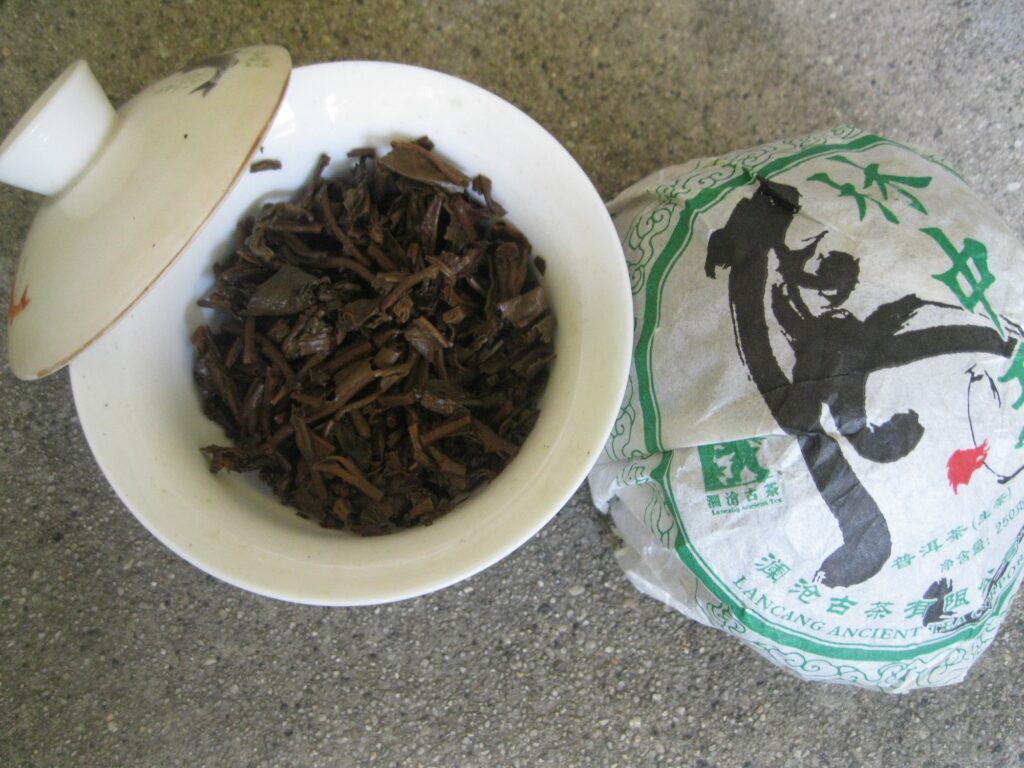Lemon Swimmin’

Lemon Swimmin‘ is a catchy title describing a couple raw productions drunk recently, LME Early Spring, and Tiger Tuo, LCGC. The two have some differences despite swimmin’ in lemon. In the following passage, lets’ take a look at the storage parameters, some tea factory highlights, and taste features just for fun.
Storage
The LME Spring came into the cave sometime in ’23, a re-upping from a batch acquired around ’18. It resides in the bazhong box along with other LME productions. Weather conditions in ’24 were cooler than previous years. Hydrating started imparting an undesired heavy aroma, so since around May items have been stored sans any hydration. It drank very well straight from storage.
The Tiger Tuo sat out for about 15 days, also a re-upped offering this time acquired around early ’21 and originally in late ’15. Dry-stored, this tuo has been consumed from the “for the ready” fridge. Transformation has been conservative due to the very moderate temps the last few years. Drinking directly from the fridge doesn’t do it justice, particularly coming at sweetness’ expense.
Company
As the name indicates, LME specializes in Menghai, Banzhang material. All of their neipiao (inner ticket) from this era are identical, indicating BZ, Bulang, and Nannuo material. Differences standout despite neipiao genericness. LME stands for Laoman’e a mountain/terror not far from the BZ area and is known for being especially bitter. Just for clarity, LME here refers to the brand, though it is often just a reference to the terroir. This brand has a very solid reputation in terms of raw and ripe productions.
LCGC designates Lancang Ancient Tea. They specialize in Jingmai and Jingmai blended productions. Since about ’18 their reputation for ripes has far surpassed their raws. Interestingly, they use their best material in crafting tuo. The factory is a woman-owned private enterprise, with origins going back to the late 60s at the height of the Cultural Revolution (1966-1976).
Taste
LME Spring previously tasted of old chrysanthemum. For reasons possibly relating to age or storage, lemon swims presently. Without being piercing, the taste is bright and cheerful, evocative of Lemon Heads but nowhere as sweet. Fruit is a characteristic stage of many raws, but transitioning from old flowers to lemon is a new discovery. Chances are that this lot received lighter storage than the previous, possibly never undergoing a chrysanthemum stage.
Tiger presents an interesting study in the evolution of a bright pine and pineapple-y tuo into lemon. Weather plays such a huge role along with storage in the expression at any given time. A previous entry notes root beer expression from a few years of very warm weather. This most recent iteration is characterized by lemon-wood-petrol, with nice sweetness edged by unabashed bitterness. The personality is darker than the LME Spring, though the broth is lighter.
Wrap-Up
Lemon Swimmin‘ features two raw productions possessing strong lemon traits. LME Spring is new to the lemon party, while Tiger Tuo has always possessed some citrus-esque attributes. Both are re-acquisitions from previous fairly conservatively stored conditions in Mainland. Both are lemon swimmers, but LME Spring’s bright nature evokes childhood lemon, while the Tiger’s wood and petrol combine to spin a more complex yarn.
